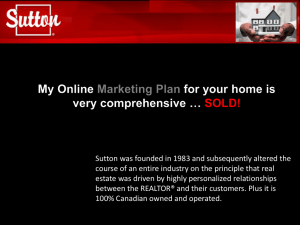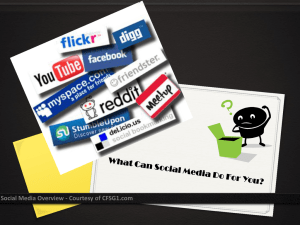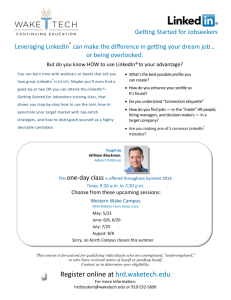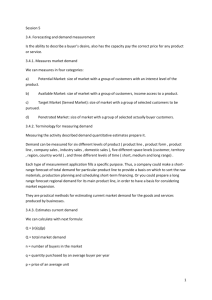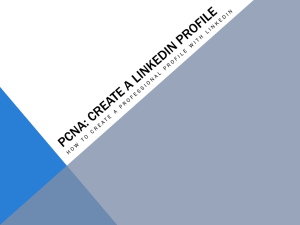Social Selling Solutions
advertisement
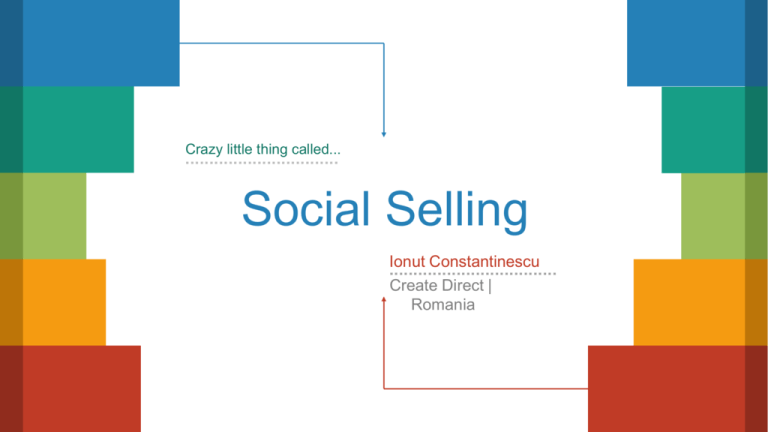
Crazy little thing called... Social Selling Ionut Constantinescu Create Direct | Romania A preview of the journey Start Social... what? , Please, tell me more! What’s the big Well, I’m not buying it! fuss? 2 Okay, you had my curiosity... Now you have my attention Ask yourself this... Some questions you need to ask yourself ... Bring it on!!! Okay, NOW we are ready! 3 The process, simplified Follow the social brick road to the magical land of closed deals! The holistic aproach Sales + Marketing = LOVE! Setting things up Transform the sales and marketing teams! 4 Case studies! Well, if it’s working for these guys... Conclusion Remind me again, why are we doing this?, Finish 5 What is social selling? Jamie Shanks: Meeting the buyer where the John Byrne: Socially selling like any sales skill it is a buyer is and arming themselves with information, to make informed decisions – ONLINE. Social Selling is also about leveraging these online tools to help a sales professional have a more pertinent and effective conversation with their buyers discipline. By using social media, with particular emphasis on LinkedIn to connect, inform, educate and influence your prospective buyers and existing clients. It does not eliminate the need for traditional professional sales skills, rather it can enhance them helping to elevate the salesperson to a Trusted Advisor. Social selling is the new norm. But it’s a tool, not a magic wand. Why is it important? 72% 64% Source: DemandGen Source: Hubspot 72% of buyers use social media to research before making a purchase. They’re looking up product and brand information. They’re checking references. They’re asking the opinion of their connections and your customers. Half of the buying process is completed before a sales person even reaches them. 64% of sales teams that use inbound social selling reach their quotas 77% Source: Hubspot 77% of B2B purchasers said that they would not even speak to a sales person until they had done their own research 81% Source: LinkedIn Your social media presence is your introduction to these buyers. In fact, 81% are more likely to engage with a strong, professional brand. 7 Employees are (already) social Employees interact on social networks on a daily basis. Facebook: 63% at least once/day (40%, multiple) Instagram: 57% at least once/day (35%, multiple) Twitter: 46% at least once/day (29%, multiple) 56% of employees are either content curators or creators. 46% like to share original content (photos/video) 41% share content they find elsewhere online Employees average 200+ connections per social network. Facebook: 285 friends Twitter: 208 followers LinkedIn: 190 connections 8 Sorry to let you know, but... Awareness The marketing funnel is dead! Interest The new customer path to purchase is much more winding and sophisticated, and smart companies have begun to adapt to the new approach by implementing a social selling strategy. Desire One that takes into consideration that prospects engage with companies at various points in the process, and each comes to the interaction with a different level of knowledge, interest, and sophistication. What was once a linear, guided process is now a complex, non-linear journey. Action Oh no, what happened? The rise of social media gave consumers more options than ever before. Even more importantly, prospects now have the ability to perform many of the funnel tasks on their own. From researching features to talking to current product owners, consumer education has largely become a do-it-yourself effort. 9 There’s a new model in town Buy Explore This phase encompasses all the complex tasks that today’s sophisticated consumers perform when shopping for an item. Extensive Internet searches, hands-on experimentation, such as test-driving a car, reading reviews etc. Discover Similar to the Awareness step, .this point stresses the importance of marketing strategies that let prospects know about your company. At this point, prospects are ready to complete a transaction. Yet they may go through a few more iterations before making the purchase. Looking for coupons or promo codes or searching for sales are typical behaviours. Engage The actual interaction with the brand. Such as using the product or service, visiting the website for usage ideas, and engaging with other customers. The New Path to Purchase Starts with aligning the sales and marketing strategy with the consumer decision journey 10 Ask yourself this What resources will I need?. Do I trully need it? Is my client ./ company prepared for this? What will I do with all the money, fame and success? “Easy” as 1, 2, 3 It’s not simple but it does worth it! Step 1 Step 2 Step 3 Research Set-up Build 12 Research 01 02 03 Social Listening Identify the relevant conversations in order to capture relevant buying signals. Social Searching Identify sale opportunities and refine your social listening keywords. Social prospecting Find professionals within your target market and build segmented lists. Stay focused! Research can easily become overwhelming or paralyzing. It is therefore essential to have purpose and pragmatism in the research efforts. Focus on key people, keywords and conversations. 13 Set-up: The foundation Social profiles Create professional social profiles for both of your employees, your products and your company. Content Set-up a monthly content calendar. Start a blog, create white-papers, case studies, research and publish them on your social channels Training Train your employees on how, what and when to communicate with their contacts. Set-up a crisis management response plan. Measurement Decide on the KPI’s that will allow you to measure your social selling success. Choose the right tools for the job! 14 Set-up: the sales team Start transforming your sales-team’s online brand and provide the tools and training needed so they can stay authentic online. Concentrate less on the sales angle and more about sharing quality content and building connections. Authority Buyers don’t want to close with a salesperson, they want to find an expert and partner who can help their business succeed. Credibility Curating content, answering questions, and providing assistance to buyers (even outside your products and services) will help you build credibility. Presence Be present where the buyer is – LinkedIn, Twitter, Facebook Groups, and other industry sites are all great networking sites where sales professionals can find buyers or build a great reputation. Trust Trust is the basis by which every B2B buyer makes their decision. Trust is the key to every business opportunity online and is typically the last barrier in the purchase decision. Consideration Once you have the buyer’s trust, they’ll reach out when they see that you can help them. Use SSI The Social Selling Index (SSI) measures progress across the four pillars of social selling. See it here 15 Set-up: the marketing team Give Sales visibility into their prospect’s digital behaviour Make your sales organization a partner on all programs and campaigns Use SM tools to track the conversations that people are having around your brand and your industry and the content they use Help Sales understand the best use for all content you offer The Marketer Empower your sales force to have intelligent conversations. 16 Case study: PayPal Challenges Results Social networking has become one of the strongest lead sources for marketing Identify key decision makers Manage multiple stakeholders across the prospect company More relevant points of contact keep momentum through the sales process Maintain momentum through a lengthy sales process 20-30 of the deals being worked on at any time are sourced through LinkedIn Social Selling Solutions: Find connected decision makers through LinkedIn profiles and Advanced Search Use social networking and research to map the buying committee of prospective client organizations 17 Case study: ADP Challenges Results Leads worked by sales increased 21% Deliver better qualified leads to sales Win rate of leads increased 103% Improve salesperson productivity Total amount of won deals increased 26% Generate net new sales revenue Revenue increased 48% year-over-year Social Selling Solutions: ADP aligned marketing and sales to adopt a common definition of a good lead ADP’s marketing team targeted content to stakeholders at various levels 18 Case study: Oracle Challenges Results Establishing relationships through shared connections on LinkedIn led to a 30% increase in engagement with key connections. Quickly connect with buying committees Generating lead lists was inefficient and time-consuming Sales cycles shortened by 20% due to relationship building through social networking. Long sales cycles Social Selling Solutions: Used LinkedIn’s tools to empower marketing to quickly generate lead lists Create warm introductions and better relationship building through social networking 19 Case study: IBM Challenges Results 400% Increase in Sales During B2B Pilot Program Make social a prominent—rather than marginalized—part of the sale process. 3,000 new LinkedIn followers which therefore expanded their reach from 54,000 to 1.3 million. Resistance from the staff who complained that they didn’t have the time to engage in social. Social Selling Solutions: A training into social selling of the seven B2B sales reps in IBM’s Cloud Computing product division Deploying social listening to help discover conversations that were occurring about cloud computing. Inside and outsode content provided to the teams to be used during social conversations. 20 Social media and social selling can accelerate finding, managing and closing business. While traditional selling involves reaching out to customers where you think they are or want them to be, if you get social selling right, you’re reaching people where they actually are, and you have them reaching out to you as well. - Simon Porter, Vice President of IBM Thank You! 22
